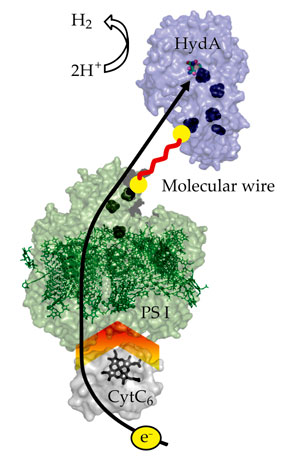Tethered proteins speed up photosynthetic electron transfer
DOI: 10.1063/PT.3.1429
Tethered proteins speed up photosynthetic electron transfer. Few renewable-energy technologies can match the simplicity of the natural photosynthetic reaction in which water in chlorophyll-imbued plants and simple organisms is converted into O2 and the fuel source H2. In cyanobacteria, a chlorophyll-containing organism, proteins shuttle electrons that drive the production of H2 through the reduction of H+; however, the process is limited by the diffusion. Now, researchers at the Pennsylvania State University and Ruhr University Bochum in Germany have devised a faster system in the lab. As shown in the image, the photosystem reaction center (PS I; green)—a photon-absorbing complex found in cyanobacteria—is cross-linked to CytC6, an electron-transfer protein. That hybrid molecule is then tethered to HydA—the proton-reducing catalyst—by a synthesized hydrocarbon chain (jagged red line) that acts like a molecular wire and allows electrons to tunnel through. Thus the system achieves an electron-transfer rate of 105 per second per reaction center—roughly twice the total rate achieved by an efficient cyanobacterium. The researchers say that the stability and flexibility of their design makes it suitable for a variety of commercial solar-biofuel-producing systems. (C. E. Lubner et al., Proc. Natl. Acad. Sci. USA 108, 20988, 2011.)






